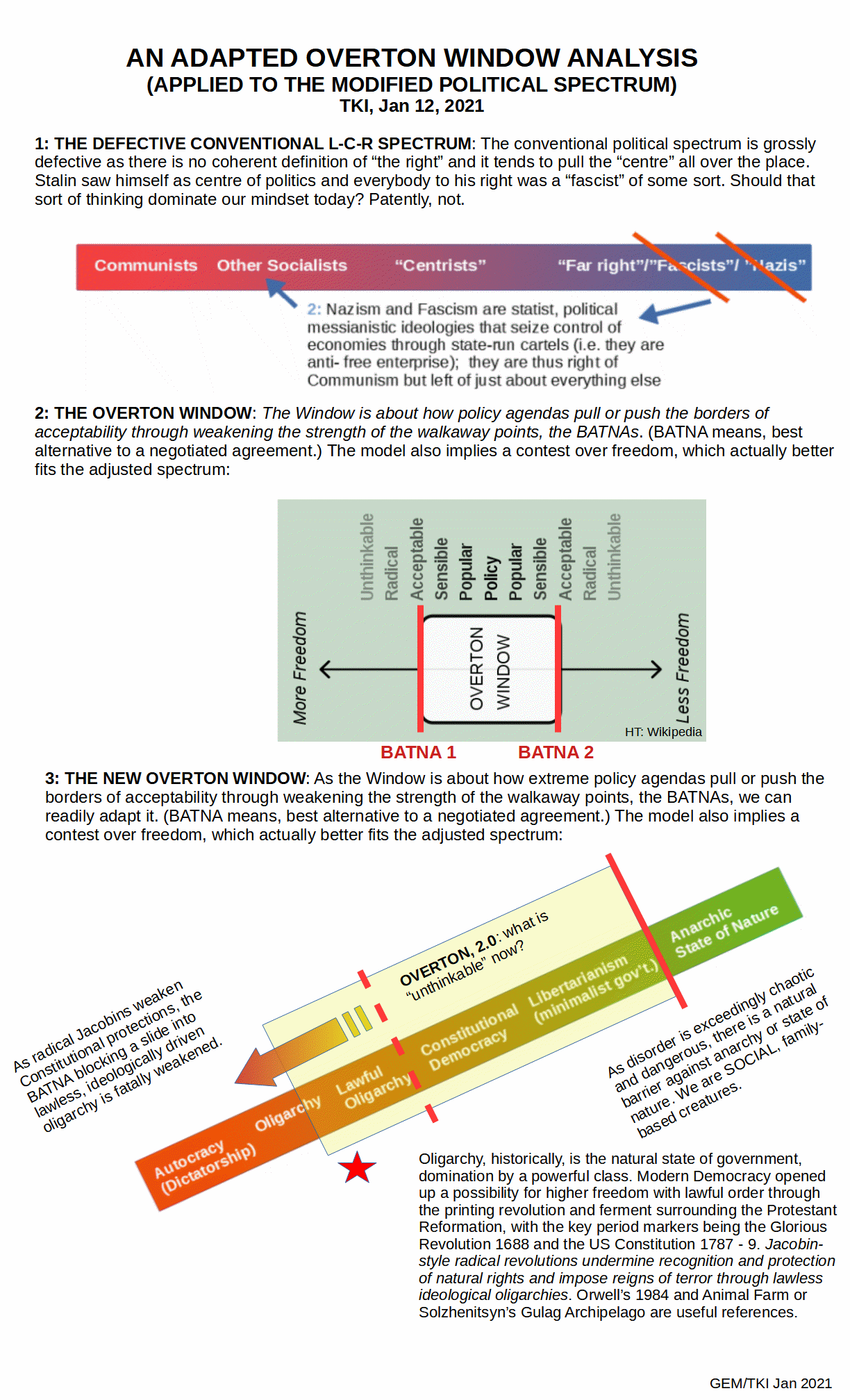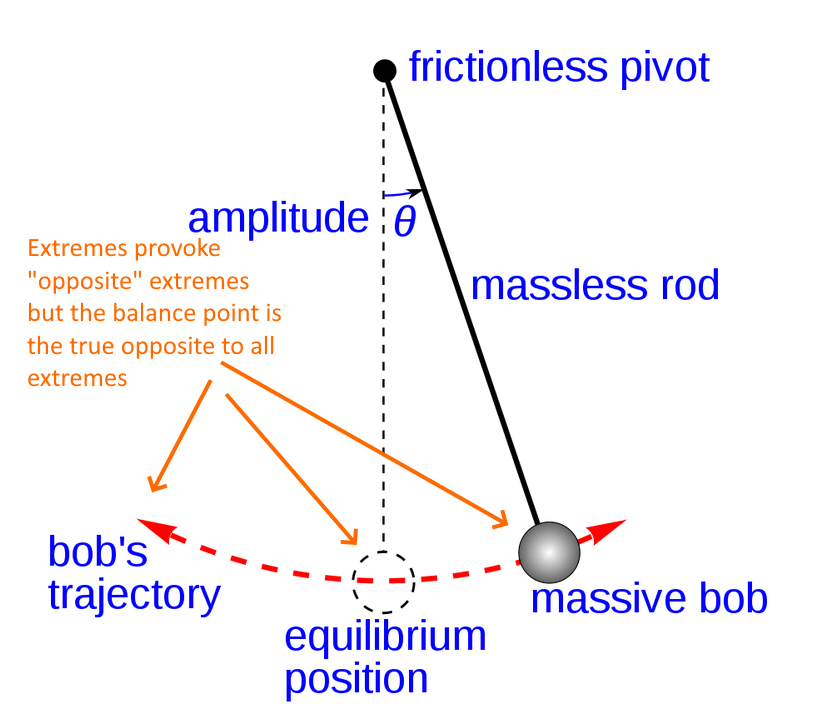In a given time and culture, characteristic fashionable fallacies too often gain persuasive power by mutual reinforcement, and/or by swinging from one extreme to another; bypassing the point of responsible balance. So, too, we end up in a thorny thicket of errors, a hard-to-escape problematique.
And yes, that often includes the [neo-]marxist version of the Hegelian triad, thesis, antithesis, synthesis, repeat.
Where, too, babylonian captivity to the spirit of the age or the community . . . nowadays, strongly shaped by relativism . . . is of the very essence of ill advised worldly, destructive false “conventional wisdom.”
We must ask, then, what are the crooked yardsticks that we have substituted for what is truly straight, accurate, upright?
(Have we reached the absurdity where we challenge even naturally upright and straight plumb-line, self-evident truths that would expose our need to correct systematically warped thinking? Are we trapped by different, imposed brands of crookedness . . . as, each particular form of crookedness is distinct from others. In turn, that may trap us in polarisation of opposed errors, distracting us from that point of equilibrium and uprightness established by plumb-lines.)
Let’s put a select few candidates on the table:
- Chronological snobbery, whereby we trap ourselves in intellectual fads (and ideological agendas) of our times by automatically disregarding lessons of the past as “outdated”
- Novelty-ism, whereby the ad-man’s “new and improved” or “fashionable trends” trap us in a thirst for the latest intellectual fashions
- Some few, of course, may instead so mistrust the new that they are blindly traditionalist (especially, when they lack the prosperity to risk the novel)
- Imagining that History is bunk or victory propaganda, so disregarding its hard-bought, sound lessons — dooming ourselves to pay in the same coin of blood and tears over and over again
- Relativism and subjectivism, which so undermine the significance of warrant based on due use of right reason as a corrective to our error-proneness, that we lose sight of the balance and reliability of resulting objective truth
- Radical empiricism, by which we equate objectivity with materiality, tangibility and concreteness, often seen as “the real world,” thereby swallowing evolutionary materialism and/or its fellow travellers and losing sight of key abstract entities, relationships and states of affairs (including mathematics, morality, mind, truth and more)
- Blind, [neo-]marxist Progressivism, whereby the socio-cultural version of the Hegelian Dialectic, often in the guise of so-called critical theories [i.e. culture-form marxism], trap us into the dismissal of the past as an oppressive discredited agenda; so that some are forever trapped in thesis, antithesis, synthesis and so the next round of items on an increasingly radical, often anticivilisational agenda
- Scientism, whereby the “progress” of science and agendas of those flying that flag are seen as monopolising or at least utterly dominating knowledge
- And, far more.
Art Lindsley, of the C S Lewis Institute, writes — yes, in the context of Lewis’ return to Christian faith (from the atheism of his youth):
Lewis’s question was: How could this an-
cient religion be relevant to my present setting? Lewis
defines this chronological snobbery as “the uncriti-
cal acceptance of the intellectual climate of our own
age and the assumption that whatever has gone out
of date is on that count discredited.” Lewis eventually
came to understand the need to ask further questions
such as: Why did this idea go out of date? Was it ever
refuted? If so, by whom, where, and how conclusively?
In other words, you need to determine if an old idea
is false before you reject it; we would not want to say
that everything believed in an ancient culture was
false. Which things are false—and why—and which
things remain true?
Lewis came to the further conclusion that our own
age was merely a period which, like past periods, has
its own characteristic illusions. We can unthinkingly
take for granted certain cultural assumptions, unless
they are questioned. The classic illustration is the frog
in the kettle. If you put a frog in a kettle of water and
slowly turn up the heat, the frog adjusts to the rising
temperature and therefore does not jump out—until
it is too late. In a similar way, we can be affected by
our cultural environment, yet be unaware of the sig-
nificant impact being made on us.
Nor, is this a modern phenomenon. We find the attitude of Athenians, c 50 AD, described thusly by their fellow Greek, Luke:
All the Athenians and the foreigners who lived there spent their time doing nothing but talking about and listening to the latest ideas. [Ac 17:21, NIV 2011.]
Of course, the trick to that was, they were interested only in the latest ideas that tickled their itching ears and reinforced their preferences and underlying system. Something that was truly, plumb-line, back to core but neglected truths radical, they were on the whole not interested in and would shortly laugh out of court.
But it remains the case that the apostle Paul owned the future by, in his opening words, exposing the fatal foundational crack shown by their maintaining the now famous altar to the unknown god. Yes, they had a monument to their ignorance on the most significant, central question of all, root of reality and source of moral government. (Today, many only pretend to knowledge that there is no such root; such have not really progressed.)
The issue is to restore the plumb-line, correcting crooked yardsticks. Or, changing the metaphor through Jesus of Nazareth’s answer to the dilemmas lurking in Plato’s parable of the cave, in the all-time greatest sermon, given on a Mountainside in Galilee:
Matt 7:22 “The eye is the lamp of the body. If your eyes are healthy,[c] your whole body will be full of light. 23 But if your eyes are unhealthy,[d] your whole body will be full of darkness. If then the light within you is darkness, how great is that darkness!
In plumb-line terms:

Or, in Overton Window, policy and ideological agenda terms:

Of course, today, an obvious case in point is the dangerously lawless mismanagement of the global pandemic, complete with officialdom dressed up in the lab coat of “Science.” Too often, not merely erroneously so called but sometimes . . . on fair comment . . . there may have been fraud in the moral sense — or at least willful deceit or negligence of duties of care tied to Hippocratic principles — connected to unduly marginalising unfashionable [and less profitable] alternatives. Needlessly costing lives. Further, some very disturbing precedents have been set for censorship, surveillance and control of the population. Lawless ideological oligarchy is manifestly on the march.
Pardon a vid as linked HT Jerry:
But, such is only a study on the point, our focal issue is the error of trying to tell truth by the clock. In C S Lewis’ words, one tells time by the clock, not truth. END
PS: Lewis also said, that old books are a corrective to the errors of our time, as we can readily identify such errors as they made in their day, and by their insights, we can often begin to sense where we have become caught up in the spirit of our own age. Thus, we see the need to seek and heed, hard-bought lessons of history. He suggested that were they accessible, books of the future would be equally corrective. He, of course, thought that such were not available. However, there are such things as men who are ahead of their time and if we can find and listen to such, as with Jesus c 30 AD and Paul c 50 AD, that may give a glimpse of those future books. I would argue that Dallas Willard’s closing work on the disappearance/ marginalisation of moral knowledge is also of that character. Let us listen to, rather than stand aside and watch as some set out to kill our prophets.
